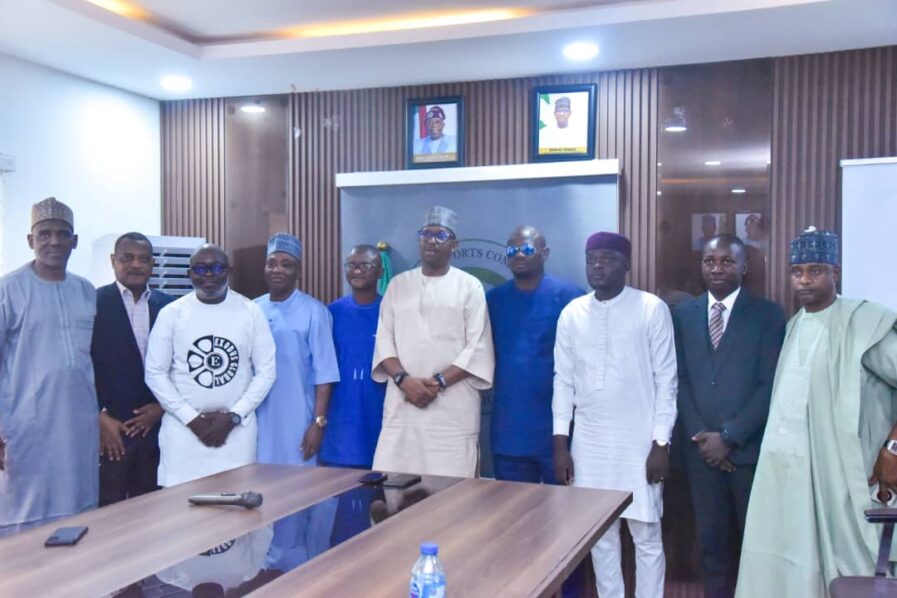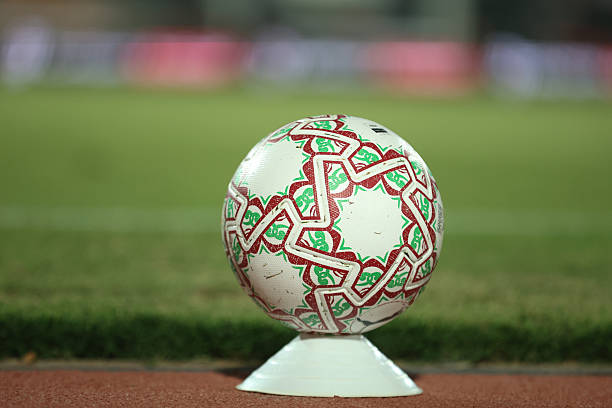
The Nigerian chapter of the Africa Football Agents Association (AFAA-Nigeria) has met with the Chairman of the Nigeria Sports Commission (NSC), Shehu Dikko, to discuss strategies for enhancing the operational standards and overall growth of football in the country.
The meeting, held at the NSC headquarters in Abuja on Friday, 28 February 2025, was led by AFAA-Nigeria President, Michael Sodeke, alongside key officials, including Acting Secretary Oluwafemi Davies-Awe, Gbenga Oluwanifise, Eddie Iseri Ogbemudia, and Destiny Omonigho.
During discussions, the delegation outlined AFAA-Nigeria’s vision, stressing the need for operational standards, better player representation, and stronger collaboration among stakeholders in the Nigerian football ecosystem.
In his welcome remarks, Dikko recognised AFAA-Nigeria as a key stakeholder in the country’s football industry. He assured the delegation that the NSC is committed to working with football agents to improve player welfare and professional standards in Nigeria.
However, Sodeke criticised the Nigeria Football Federation (NFF) for its inaction on crucial regulatory issues. He lamented that despite several collaborative efforts by AFAA-Nigeria, the NFF has remained largely unresponsive in addressing industry concerns.
Key Resolutions from the Meeting
Both parties agreed on several action points to improve football management in Nigeria:
1 Strengthening Synergy Between NFF and AFAA-Nigeria
AFAA-Nigeria and the NFF must work closely to regulate football agents effectively and promote transparency in player representation.
2 Reinvestment into the Football Industry
Football agents should be encouraged to reinvest in grassroots football development to create a sustainable talent pipeline for the national team and clubs.
3 Holistic Player Representation
Agents must prioritise the overall well-being of players by providing financial literacy training, career transition planning, and mental health support.
Dikko referenced the recent death of a Nigerian footballer in Uganda, stressing that players should not be taken to obscure leagues that do not contribute to their career growth.
4 Improving Players’ Welfare in the Domestic League
Ogbemudia highlighted the urgent need for better welfare policies for players in the Nigerian domestic league to discourage migration to substandard leagues abroad.
He commended the NFF for setting up the Players’ Status Committee to resolve contractual disputes but criticised the federation’s slow response to urgent player welfare issues. He cited the case of a Nigerian player stranded in a Ukrainian deportation camp, whose case was ignored despite official correspondence submitted to the NFF General Secretary’s office.
5 Mandating Licensed Agents in All Transfers
AFAA-Nigeria proposed regulations requiring a licensed agent in all player transfers to ensure proper legal and professional representation, particularly for domestic league players who often struggle with contract terms.
6 Integrating Football into Education
The stakeholders emphasised the need to integrate football into school curriculums, advocating for policies that bring structured sports education back into Nigeria’s academic system to improve player development.
In his closing remarks, Dikko praised AFAA-Nigeria’s dedication to raising industry standards and assured them of the NSC’s support in strengthening Nigerian football.
AFAA-Nigeria President, Sodeke, expressed appreciation for the NSC Chairman’s backing and reaffirmed the association’s commitment to ensuring Nigerian players receive quality representation and fair treatment both locally and internationally.






